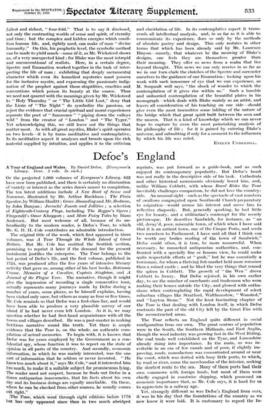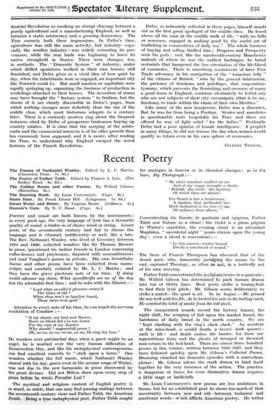Defoe's England
OF the projected 1,000 volumes of Everyman's Library, 822 have now been published, and there is certainly no diminution of variety or interest as the series draw's nearer to completion. The ten latest additions include A New Book of Sense and Nonsense, illustrated by Mr. Arthur Rackharn ; The Plain Speaker, by William Hazlitt ; Grace Abounding and Mr. Badman, by John*Bunyan ; Jorrocks' Jaunts and Jollities ; a selection of Eighieenth-Century Plays, including The Beggar's Opera ; Fitzgerafd's Omar Khayyam ; and More Fairy Tales by Hans Anderseil. But most welcome of all, because of its un- familiarity to the modern reader, is Defoe's Tour, to which Mr. G. D. H. Cole contributes an admirable introduction.
The original title of the work, which first appeared in three volumes; was A Tour Through the Whole Island of Great Britain. But Mr. Cole has omitted the Scottish section, promising to reprint it later if the demand for the present instalment justifies the enterprise. The Tour belongs to the last period of Defoe's life, and the first volume, published in 1724, was produced after the five years of intensive literary activity that gave us, among other of his best books, Robinson Crusoe, Memoirs of a Cavalier, Captain Singleton, and A Journal of the Plague Year. The narrative, though it might give the impression of recording a single consecutive tour, actually represents many journeys made by Defoe during a number of years, some places, as he himself explains, having been visited only once, but others as many as four or five times. Mr. Cole reminds us that Defoe was a first-class liar, and would have been able to produce a very plausible survey of our island if he had never even left London. As it is, we may question whether he had first-hand acquaintance with all the towns and villages described. He was a past-master in making fictitious narrative sound like truth. Yet there is ample evidence that the Tour is, on the whole, an authentic com- pilation of actual memories. To begin with, it is known that Defoe was for years employed by the Government as a con- fidential spy, whose function it was to report on the state of opinion in all parts of the country. And secondly, economic information, in which he was mainly interested, was the one sort of information that he seldom or never invented. " He knew too much about it," says Mr. Cole, " and itinterested him too much, to make it a suitable subject for promiscuous lying. The reader need not suspect, because he finds out-Defoe in a dozen antiquarian inaccuracies, that his facts about his own day and its business doings are equally unreliable. On these, where he can be checked from. other sources, be usually comes out right."
.The Tour, which went through eight editions before 17^18 but has only appeared since then in two much abridged
reprints, was put forward as a guide-book, and as such enjoyed its contemporary popularity. But Defoe's heart was not really in the descriptive side of his task. Cathedrals and other historical monuments obviously bored him, and, unlike William Cobbett, with whose. Rural Rides the Tour inevitably challenges comparison, he did not love the country.. side. An unusual sight—such as the spectacle of vast numbers of swallows congregated upon Southwold Church preparatory to migration—would arouse his interest and move him to reflective ,rhapsody. But, generally speaking, he had little eye for beauty, and a utilitarian's contempt for the merely picturesque. He describes Sandwich, for instance, as " an old, decay'd, poor, miserable town, of which when I have said that it is an antient town, one of the Cinque Ports, and sends two members to Parliament, I have said all that I think can be worth any bodies reading of the town of Sandwich." Defoe could often, it is true, be more resourceful. When necessary, he ransacked antiquarian authorities, and, con- fronted with a specially fine or famous view, he could make quite respectable efforts at " gush," but he was essentially a townsman, for whom a thriving fish-market held more romance than a ruined castle ; and he liked the very things that roused the spleen in Cobbett. The growth of " the Wen " drove Cobbett to frenzy. But Defoe rejoiced, in his own earlier day, to see the number of merchants and tradesmen who were making their homes outside the City, and glowed with enthu- siasm when contemplating the rapid development of select suburban villages like Stratford, Walthamstow, " Wanted," and " LaytOn Stone." Not the least fascinating chapter of the Tour is that dealing with London itself, in which Defoe contrasts the part of the old City left by the Great Fire with the reconstructed areas.
The Tour reflects an England quite different in social configuration from our own. The great centres of population were in the South, the Southern Midlands, and East Anglia, though the wool industry was growing fast in the West Riding, the coal trade well established on the Tyne, and Lancashire already rising into importance. In the main, as was in- evitable in an era of few canals and of poor, if slightly im- proving, roads, manufacture was concentrated around or near the coast, which was dotted with busy little ports, to which, by road or river, came the merchandise of the interior, seeking
the shortest route to the sea. Many of these ports had their
own commerce with foreign lands, but most of them were chiefly engaged in coastwise shipping, which possessed an economic importance that, as Mr. Cole says, it is hard for us to appreciate in a railway age.
Yet, strangely different as was Defoe's England from ours, it was in his day that the foundations of the country as we now know it were laid. It is customary to regard the In-
dustrial Revolution as marking an abrupt cleavage between a purely agricultural and a manufacturing England, as well as between a static aristocracy and a growing democracy. The Tour corrects both these impressions. In Defoe's time, agriculture was still _the main activity,_ but industry—espe- cially the woollen industrywas widely extending its pro- venance, while the iron trade was beginning to leave its native stronghold in Sussex. -There were changes, too, in methods. The Domestic System " of industry, under which skilled- operatives worked in their own houses, still flourished, and Defoe gives us a vivid idea of how quiet by day, when the.inhabitants were so _engage,d,.an important city like Norwich could be. But small masters or capitalists were rapidly springing up, organizing the business of production in workshops attached to their houses. The invention of steam may have brought the " factory system " to fruition, but the shoots of it are clearly discernible in Defoe's pages, from which nothing emerges more definitely than the rise of the middle class, which most historians relegate to a century later. There is a curiously modern ring about the frequent instances cited by Defoe of prosperous tradesmen buying up country estates. It is clear that the merging of the aristo- cratic and the commercial interests is of far older growth than has commonly been supposed, and it is easier, after reading the Tour, to understand why England escaped the worst features of the French Revolution.
Defoe, so intimately reflected in these pages, himself stands out as the first great apologist of the middle class. He loved above all the man in the middle walk of life, " with no frills or nonsense, engaged in making good by the useful art of trafficking in commodities of daily use." The whole business of buying and selling thrilled him ; Progress and Prosperity were his gods ; and, like the nineteenth-century Manchester radicals of whom he was the earliest harbinger, he hated restraints that hampered the free circulation of the life-blood of commerce. There is something reminiscent of later Free Trade advocacy in his castigation of the " tenacious folly " of the citizens of Bristol, "who by the general infatuation, the pretence of. freedoms and privileges, that corporation- tyranny, which prevents the flourishing and encrease of many a good town in England, continue obstinately to forbid any who are not subjects of their city soveraignty (that is to say, freedom), to trade within the chain of their own liberties."
Like many of the new bourgeoisie, Defoe was a dissenter. But he was far from being a Puritan. Stories and anecdotes in questionable taste besprinkle his Tour, and these are offered by way of light relief " for the ladies." Evidently Defoe had a poor opinion of female intelligence. A prophet in many things, he did not foresee the day when women would qualify as tutors even in his own sphere of economics.
GILBERT THOMAS.































































 Previous page
Previous page